九年级英语上册人教版电子版教案
- 格式:doc
- 大小:11.24 MB
- 文档页数:120
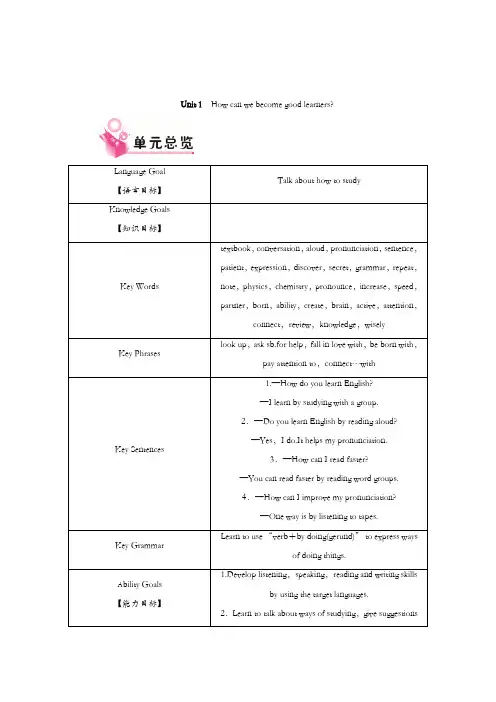
Unit 1How can we become good learners?本单元围绕学习的话题,讲述了学习的障碍及对应的解决方法,对学生的学习有重要意义。
Section A内容上侧重英语学习的方法,学生要学习、训练相关的语言内容和技能。
学生要重点掌握并能熟练、正确地运用与学习主题相关的单词和各种表达学习方法的短语、功能及句型结构How do you study/learn…?I study/learn…by…How can I…?You can…by…;以及学会用“by+v.-ing形式”结构来表达方式方法。
Section B在Section A谈论英语学习的基础上,在话题上,从英语的学习困难及解决方案,拓展到优秀学习者的学习习惯;在语言上,巩固和丰富了与学习相关的话题词汇;在技能上,将听、说能力综合,突出阅读训练,由读促写;在策略上,引导学生关注优秀学生的学习方式,并借鉴运用;在情感上,鼓励学生面对困难,积极探索解决方案,不断改进学习方法,提高学习效率。
The First Period—Section A(1a-2d)Teaching Important Points【教学重点】Key words & phrases:textbook,conversation,aloud,pronunciation,sentence,patient;study for,ask the teacher for help,work with a group,be patient1.—How do you study for a test?—I study by working with a group.2.—Does anyone learn English by watching videos?—No.It's too hard to understand spoken English.3.—Have you ever studied with a group?—Yes,I have.I've learned a lot that way.Key structure:verb+by doingeg:I study by working with a group.Teaching Difficult Points【教学难点】★Practice the structure “verb+by doing”in listening and speaking.Teaching Aids【教学工具】A tape recorder,CAI or multimedia courseware.Teaching Steps【教学过程】★Step 1Leading in【新课导入】(Ⅰ)1.GreetingGreet the class and briefly talk with the students about their holidays.2.DiscussingDiscuss with the students,like this:T:What do you usually do when you study English?S1:I often read English books.T:(To class) Good.He studies English by reading English books.That's a good way.(Then to another student)Now,what do you usually do when you study English?S2:I…3.Practice with more students.★Step 1Leading in【新课导入】(Ⅱ)1.GreetingGreet the class and tell the students the goal of this unit.2.PreparationT:Today we are going to talk about how to study.How do you study English?Collect the students' answers and prepare the language items for this period.★Step 2Cooperative inquiry【合作探究】1.Finish the task in 1a①Work in groups.Add more ways of studying English.②Read these phrases in 1a.Tell them the usage of “by doing”phrases.③Help students to say out their ways of studying.2.Finish the task in 1b①Read the instructions.②Play the recording for the first time.Students only listen.③Play the recording a second time.Ask them to match the ways with the names.④Check the answers with the whole class.3.Finish the task in 1c①In groups,interview their partners about how they study for a test.②One from each group reports to the class.4.Finish the tasks in 2a-2b①Use PPT or pictures for the students to learn the new words.Read the questions in 2a.②Get the students to guess the answers in 2b.③Play the recording for the first time.Students listen and check the questions.④Play the recording again.Students listen and match the answers with the questions in 1a.⑤Check the answers with the whole class.5.Finish the task in 2c①Show the pictures of the conversations.②Students work in pairs.③Ask three pairs to say out their conversations to the class.Show the PPT to help.6.Finish the task in 2d①Talk about the picture and scan the conversation.②Ask the students to read aloud the conversation in 2d.Learn the new words and phrases.③Ask these questions:How does Jack feel at the very start?What makes him feel like this(nervous)?What's Jack's problem when he reads?And what does Annie suggest?What's Jack's problem with words?And what's Annie's advice?④Check the answers with individual students to see how well they understand.⑤Play the recording and get the students to follow the teacher in the recording.Then ask two pairs to act out the conversation.★Step 3Homework1.Do a survey:How do you study for an English test?2.Imagine that you are Jack and Annie.Make a conversation to talk about your English study.3.Translate the following sentences into English.(1)你是怎样学习英语的?我通过大量阅读来学习。
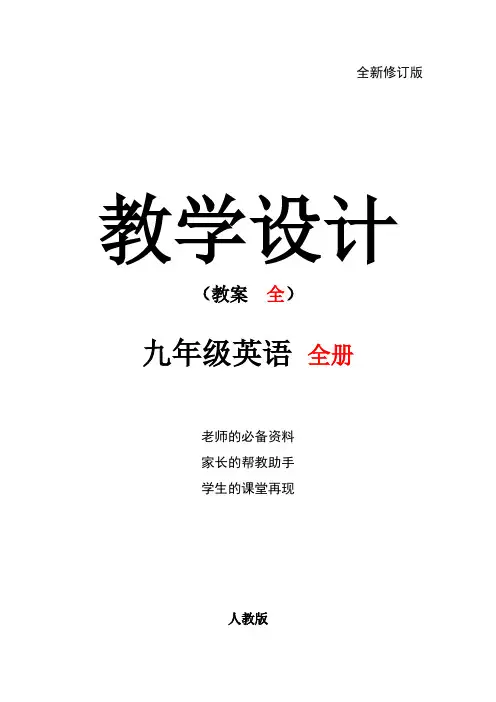
全新修订版教学设计(教案全)九年级英语全册老师的必备资料家长的帮教助手学生的课堂再现人教版目录Unit 1How can we become good learners (003)Unit 2I think that mooncakes are delicious! (013)Unit 3 Could you please tell me where the restrooms are? (023)Unit 4I used to be afraid of the dark (031)Unit 5What are the shirts made of? (042)Unit 6When was it invented? ....................... (054)Unit 7Teenagers should be allowed to choose their own clothes (064)Unit 8It must belong to Carla (074)Unit 9I like music that I can dance to (083)Unit 10You're supposed to shake hands....... (093)Unit 11Sad movies make me cry (102)Unit 12Life is full of the unexpected..... . (122)Unit 13We are trying to save the earth! (156)Unit 14I remember meeting all of you in Grade 7 (172)Unit 1How can we become good learners?第一课时Section A(1a-2d)I. Target Navigation【目标导航】◆Key words and phrases:textbook,conversation,aloud,pronunciation,sentence,patient,by+v.ing◆Key sentences:(1)How do you study for a test?I study by working with a group.(2)Have you ever studied with a group?Yes,I have. I've learned a lot that way.(3)It's too hard to understand spoken English.◆Skills:能够熟练地谈论怎样学习的话题,以及回答自己的学习方式。
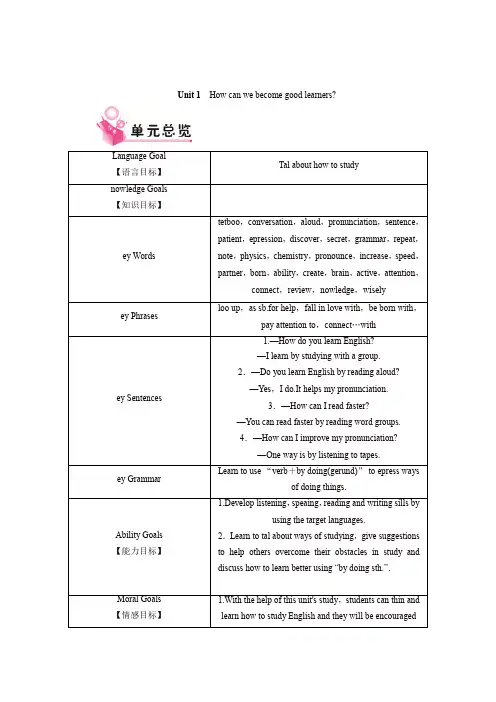
Unit 1How can we become good learners?本单元围绕学习的话题,讲述了学习的障碍及对应的解决方法,对学生的学习有重要意义。
Section A内容上侧重英语学习的方法,学生要学习、训练相关的语言内容和技能。
学生要重点掌握并能熟练、正确地运用与学习主题相关的单词和各种表达学习方法的短语、功能及句型结构How do you study/learn…?I study/learn…by…How can I…?You can…by…;以及学会用“by+v.-ing形式”结构表达方式方法。
Section B在Section A谈论英语学习的基础上,在话题上,从英语的学习困难及解决方案,拓展到优秀学习者的学习习惯;在语言上,巩固和丰富了与学习相关的话题词汇;在技能上,将听、说能力综合,突出阅读训练,由读促写;在策略上,引导学生关注优秀学生的学习方式,并借鉴运用;在情感上,鼓励学生面对困难,积极探索解决方案,不断改进学习方法,提高学习效率。
The First Period—Section A(1a-2d)Teaching Important Points【教学重点】ey words & phrases:tetboo,conversation,aloud,pronunciation,sentence,patient;study for,as the teacher for help,wor with a group,be patientey sentences:1.—How do you study for a test?—I study by woring with a group.2.—Does anyone learn English by watching videos?—No.It's too hard to understand spoen English.3.—Have you ever studied with a group?—Yes,I have.I've learned a lot that way.ey structure:verb+by doingeg:I study by woring with a group.Teaching Difficult Points【教学难点】★Practice the structure “verb+by doing” in listening and speaing.Teaching Aids【教学工具】A tape recorder,CAI or multimedia courseware.Teaching Steps【教学过程】★Step 1Leading in【新课导入】(Ⅰ)1.GreetingGreet the class and briefly tal with the students about their holidays.2.DiscussingDiscuss with the students,lie this:T:What do you usually do when you study English?S1:I often read English boos.T:(To class) Good.He studies English by reading English boos.That's a good way.(Then to another student)Now,what do you usually do when you study English?S2:I…3.Practice with more students.★Step 1Leading in【新课导入】(Ⅱ)1.GreetingGreet the class and tell the students the goal of this unit.2.PreparationT:Today we are going to tal about how to study.How do you study English?Collect the students' answers and prepare the language items for this period.★Step 2Cooperative inquiry【合作探究】1.Finish the tas in 1a①Wor in groups.Add more ways of studying English.②Read these phrases in 1a.Tell them the usage of “by doing” phrases.③Help students to say out their ways of studying.2.Finish the tas in 1b①Read the instructions.②Play the recording for the first time.Students only listen.③Play the recording a second time.As them to match the ways with the names.④Chec the answers with the whole class.3.Finish the tas in 1c①In groups,interview their partners about how they study for a test.②One from each group reports to the class.4.Finish the tass in 2a-2b①Use PPT or pictures for the students to learn the new words.Read the questions in 2a.②Get the students to guess the answers in 2b.③Play the recording for the first time.Students listen and chec the questions.④Play the recording again.Students listen and match the answers with the questions in 1a.⑤Chec the answers with the whole class.5.Finish the tas in 2c①Show the pictures of the conversations.②Students wor in pairs.③As three pairs to say out their conversations to the class.Show the PPT to help. 6.Finish the tas in 2d①Tal about the picture and scan the conversation.②As the students to read aloud the conversation in 2d.Learn the new words and phrases.③As these questions:How does Jac feel at the very start?What maes him feel lie this(nervous)?What's Jac's problem when he reads?And what does Annie suggest?What's Jac's problem with words?And what's Annie's advice?④Chec the answers with individual students to see how well they understand.⑤Play the recording and get the students to follow the teacher in the recording.Then as two pairs to act out the conversation.★Step 3Homewor1.Do a survey:How do you study for an English test?2.Imagine that you are Jac and Annie.Mae a conversation to tal about your English study.3.Translate the following sentences into English.(1)你是怎样学习英语的?我通过大量阅读学习。

人教版英语九年级Unit-1-教案Unit 1 How can we become good learners?学习目标认知目标:1. Talk about how to study. 学会讨论各种学习方法和策略。
2. Find out your suitable learning methods. 找出适合自己的学习方法。
情感目标:通过对学习方法的学习,培养学生用正确而科学的方法做事的能力,明白“一份耕耘,一份收获”。
技能目标:(1)熟练掌握下列词汇:aloud pronunciation discover repeat note pronounce increase speed partner create active connect review knowledge wisely born attention(2)熟练掌握下列短语:work with friends ask the teacher for help read aloud look up practice pronunciationconnect…with…pay attention to(3)掌握下列句型:How do you study English?I learn by working with a group.Do you learn English by reading aloud?Yes, I do. It helps my pronunciation.How can I read faster?You can read faster by reading word groups.How can I improve my pronunciation?One way is by listening to tapes.But whether or not you can do this well depends on your learning habits.重点、难点(Key points and difficulties)1. 学会运用how来询问做事方式2. 学会运用by + doing的结构表达做事方式。
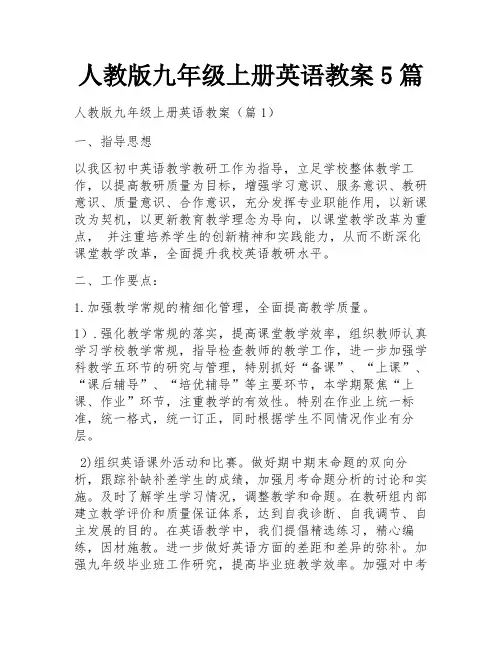
人教版九年级上册英语教案5篇人教版九年级上册英语教案(篇1)一、指导思想以我区初中英语教学教研工作为指导,立足学校整体教学工作,以提高教研质量为目标,增强学习意识、服务意识、教研意识、质量意识、合作意识,充分发挥专业职能作用,以新课改为契机,以更新教育教学理念为导向,以课堂教学改革为重点,并注重培养学生的创新精神和实践能力,从而不断深化课堂教学改革,全面提升我校英语教研水平。
二、工作要点:1.加强教学常规的精细化管理,全面提高教学质量。
1).强化教学常规的落实,提高课堂教学效率,组织教师认真学习学校教学常规,指导检查教师的教学工作,进一步加强学科教学五环节的研究与管理,特别抓好“备课”、“上课”、“课后辅导”、“培优辅导”等主要环节,本学期聚焦“上课、作业”环节,注重教学的有效性。
特别在作业上统一标准,统一格式,统一订正,同时根据学生不同情况作业有分层。
2)组织英语课外活动和比赛。
做好期中期末命题的双向分析,跟踪补缺补差学生的成绩,加强月考命题分析的讨论和实施。
及时了解学生学习情况,调整教学和命题。
在教研组内部建立教学评价和质量保证体系,达到自我诊断、自我调节、自主发展的目的。
在英语教学中,我们提倡精选练习,精心编练,因材施教。
进一步做好英语方面的差距和差异的弥补。
加强九年级毕业班工作研究,提高毕业班教学效率。
加强对中考走势的信息收集和测试研究,集中精力,争取在九年级中考中取得一个满意的成绩。
2.?以教科研引领,为教师的专业化成长打造新的平台。
1).大力开展校本教研,拓宽教师课程视野,逐渐成为学习型、反思型教师。
通过同伴互动。
充分发挥学校骨干教师、优秀教师的作用,通过“共享式的集体备课”、“探究式的课堂实践活动”和“专题式的学习讨论活动”等促进教师之间的互动,营造“集体备课、资源共享、个人加减、教后反思”的教研氛围。
结合优质课堂活动,并且推出一节具有代表性的研讨课。
(陈美红老师开课)2).根据各年级特点,进行一次主题教研活动。
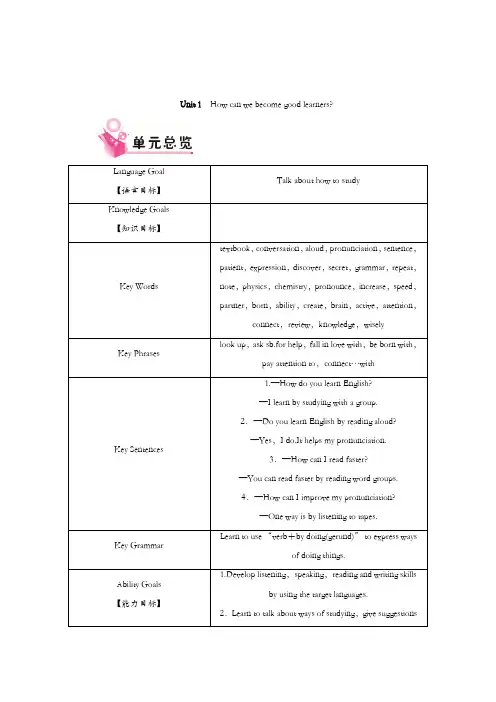
Unit 1How can we become good learners?本单元围绕学习的话题,讲述了学习的障碍及对应的解决方法,对学生的学习有重要意义。
Section A内容上侧重英语学习的方法,学生要学习、训练相关的语言内容和技能。
学生要重点掌握并能熟练、正确地运用与学习主题相关的单词和各种表达学习方法的短语、功能及句型结构How do you study/learn…?I study/learn…by…How can I…?You can…by…;以及学会用“by+v.-ing形式”结构来表达方式方法。
Section B在Section A谈论英语学习的基础上,在话题上,从英语的学习困难及解决方案,拓展到优秀学习者的学习习惯;在语言上,巩固和丰富了与学习相关的话题词汇;在技能上,将听、说能力综合,突出阅读训练,由读促写;在策略上,引导学生关注优秀学生的学习方式,并借鉴运用;在情感上,鼓励学生面对困难,积极探索解决方案,不断改进学习方法,提高学习效率。
The First Period—Section A(1a-2d)Teaching Important Points【教学重点】Key words & phrases:textbook,conversation,aloud,pronunciation,sentence,patient;study for,ask the teacher for help,work with a group,be patient1.—How do you study for a test?—I study by working with a group.2.—Does anyone learn English by watching videos?—No.It's too hard to understand spoken English.3.—Have you ever studied with a group?—Yes,I have.I've learned a lot that way.Key structure:verb+by doingeg:I study by working with a group.Teaching Difficult Points【教学难点】★Practice the structure “verb+by doing”in listening and speaking.Teaching Aids【教学工具】A tape recorder,CAI or multimedia courseware.Teaching Steps【教学过程】★Step 1Leading in【新课导入】(Ⅰ)1.GreetingGreet the class and briefly talk with the students about their holidays.2.DiscussingDiscuss with the students,like this:T:What do you usually do when you study English?S1:I often read English books.T:(To class) Good.He studies English by reading English books.That's a good way.(Then to another student)Now,what do you usually do when you study English?S2:I…3.Practice with more students.★Step 1Leading in【新课导入】(Ⅱ)1.GreetingGreet the class and tell the students the goal of this unit.2.PreparationT:Today we are going to talk about how to study.How do you study English?Collect the students' answers and prepare the language items for this period.★Step 2Cooperative inquiry【合作探究】1.Finish the task in 1a①Work in groups.Add more ways of studying English.②Read these phrases in 1a.Tell them the usage of “by doing”phrases.③Help students to say out their ways of studying.2.Finish the task in 1b①Read the instructions.②Play the recording for the first time.Students only listen.③Play the recording a second time.Ask them to match the ways with the names.④Check the answers with the whole class.3.Finish the task in 1c①In groups,interview their partners about how they study for a test.②One from each group reports to the class.4.Finish the tasks in 2a-2b①Use PPT or pictures for the students to learn the new words.Read the questions in 2a.②Get the students to guess the answers in 2b.③Play the recording for the first time.Students listen and check the questions.④Play the recording again.Students listen and match the answers with the questions in 1a.⑤Check the answers with the whole class.5.Finish the task in 2c①Show the pictures of the conversations.②Students work in pairs.③Ask three pairs to say out their conversations to the class.Show the PPT to help.6.Finish the task in 2d①Talk about the picture and scan the conversation.②Ask the students to read aloud the conversation in 2d.Learn the new words and phrases.③Ask these questions:How does Jack feel at the very start?What makes him feel like this(nervous)?What's Jack's problem when he reads?And what does Annie suggest?What's Jack's problem with words?And what's Annie's advice?④Check the answers with individual students to see how well they understand.⑤Play the recording and get the students to follow the teacher in the recording.Then ask two pairs to act out the conversation.★Step 3Homework1.Do a survey:How do you study for an English test?2.Imagine that you are Jack and Annie.Make a conversation to talk about your English study.3.Translate the following sentences into English.(1)你是怎样学习英语的?我通过大量阅读来学习。
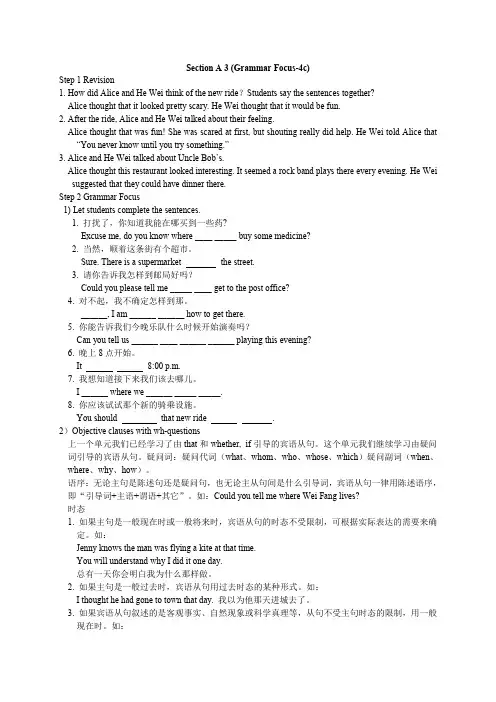
Section A 3 (Grammar Focus-4c)Step 1 Revision1. How did Alice and He Wei think of the new ride?Students say the sentences together?Alice thought that it looked pretty scary. He Wei thought that it would be fun.2. After the ride, Alice and He Wei talked about their feeling.Alice thought that was fun! She was scared at first, but shouting really did help. He Wei told Alice that “You never know until you try something.”3. Alice and He Wei talked about Uncle Bob’s.Alice thought this restaurant looked interesting. It seemed a rock band plays there every evening. He Wei suggested that they could have dinner there.Step 2 Grammar Focus1) Let students complete the sentences.1. 打扰了,你知道我能在哪买到一些药?Excuse me, do you know where ____ _____ buy some medicine?2. 当然,顺着这条街有个超市。
Sure. There is a supermarket the street.3. 请你告诉我怎样到邮局好吗?Could you please tell me _____ ____ get to the post office?4. 对不起,我不确定怎样到那。
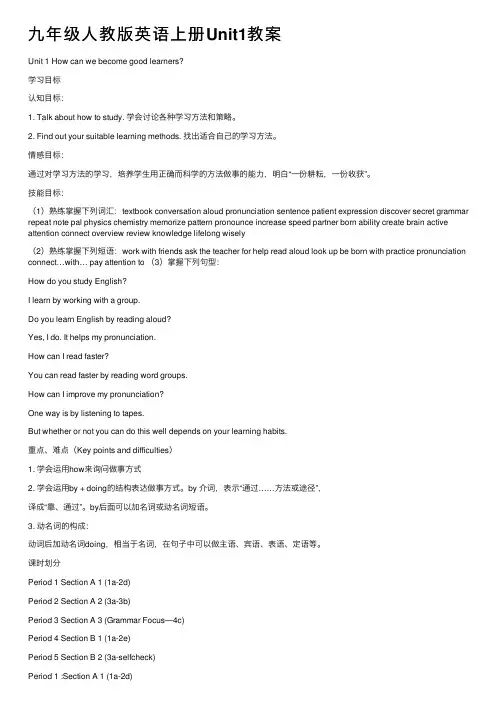
九年级⼈教版英语上册Unit1教案Unit 1 How can we become good learners?学习⽬标认知⽬标:1. Talk about how to study. 学会讨论各种学习⽅法和策略。
2. Find out your suitable learning methods. 找出适合⾃⼰的学习⽅法。
情感⽬标:通过对学习⽅法的学习,培养学⽣⽤正确⽽科学的⽅法做事的能⼒,明⽩“⼀份耕耘,⼀份收获”。
技能⽬标:(1)熟练掌握下列词汇:textbook conversation aloud pronunciation sentence patient expression discover secret grammar repeat note pal physics chemistry memorize pattern pronounce increase speed partner born ability create brain active attention connect overview review knowledge lifelong wisely(2)熟练掌握下列短语:work with friends ask the teacher for help read aloud look up be born with practice pronunciation connect…with… pay attention to (3)掌握下列句型:How do you study English?I learn by working with a group.Do you learn English by reading aloud?Yes, I do. It helps my pronunciation.How can I read faster?You can read faster by reading word groups.How can I improve my pronunciation?One way is by listening to tapes.But whether or not you can do this well depends on your learning habits.重点、难点(Key points and difficulties)1. 学会运⽤how来询问做事⽅式2. 学会运⽤by + doing的结构表达做事⽅式。

人教版九年级英语全册导学案第1课时Unit 1 Section A 1a-2c【Le arning objectives】1 Knowing:flashcard,aloud,pronunciation,skill,voice2 Habit-forming: How do you study for a test? I study by.........3 Communicating:Talk about how to study freely【Important leaning points】运用by doing 谈论学习方式【Learning process】一、自主学习(教师寄语:相信自己,一定能行!)Task1:Talk about how to study for the test1、完成下列短语和朋友一起学习制作抽认卡看课本制作词汇表听磁带向老师寻求帮助2、理解下列对话,并利用上面词组练习:A:How do you study for a test? B:I study by working with a group.A:How does Bob study for a test? B:I study by marking flashcards.3 、听录音,完成1 bTask2: Talk about how to learn English1、小组练习,利用下列句型谈论怎样学习英语.A:How do you learn English? B:I learn by ......A:Do you learn by.........? B:Yes,I do. /No, I don't.2、理解2a、2b中的句子,找出下列短语:看英文光碟和朋友连交际大声读练习发音小组学习说的技能做.........太难3、听录音,完成2a、2b4、根据听力内容,练习上面对话。
5、读听力材料,理解以下知识点:the best way to learn EnglishWho has an idea?keep a diary in Englishlook up new words in a dicctionary二、Cooperration (教师寄语:学会合作,提高自我)根据听力材料,小组自由讨论如何学好英语?三、Summary根据下面的句子,总结by的用法和含义:1、I have to be in bed by 10 o'clock.2、There is a tree by the river.3、I go to work by bus.4、The boy is sent to the hospital by a kind man.5、You can learn English by working with friends.四、诊断评价(一)补全单词:1、It's a good way to read a2、The boy often l up the words in the dictionary.3、Do you have an i about weekend?4、K a diary helps to write English every day.5、The girl often learn by a the teacher for help.6、What about reading about to practise p?(二)补全短文:A:Tom,I know you (数学学的很好)last term.How do you learn math?B:I learnt it (通过做很多题) A:What else?B: (通过向老师寻求帮助)A:Did you learn ?(通过小组学习)B: Yes, i did. ( Lucy也是)【课后反思】(教师寄语:从不断反思中完善自己,提高自己)第2课时Unit 1 SectionA 3a-4【Learning objectives】1.Knowing: specific, memorize, grammar, differently, frustrate, frusratin g, quickly, add,not at all, excited, end up.2.Understanding:Be able to understand the meaning of the passage in 3 a.municating: ---How do you learn English?---I often write vocabulary lists.【Important points】1.Understanding:Be able to understand the meaning of the passage in 3 a.municating: ---How do you learn English?---I often write vocabulary lists.【Learning process】一、自主学习Task1学习第4部分短语,谈论自己如何学习英语。
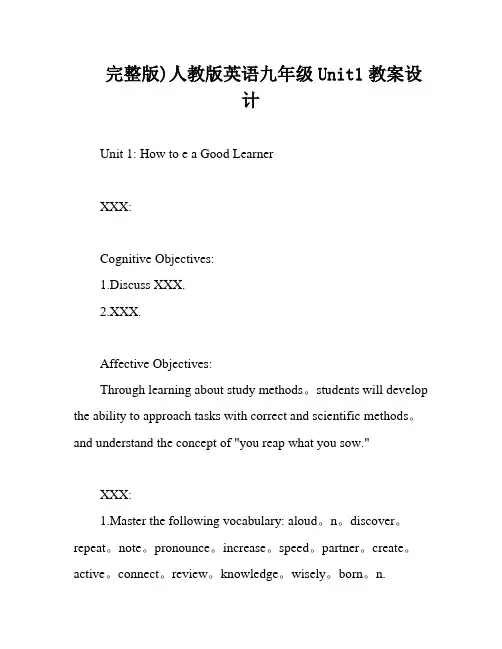
完整版)人教版英语九年级Unit1教案设计Unit 1: How to e a Good LearnerXXX:Cognitive Objectives:1.Discuss XXX.2.XXX.Affective Objectives:Through learning about study methods。
students will develop the ability to approach tasks with correct and scientific methods。
and understand the concept of "you reap what you sow."XXX:1.Master the following vocabulary: aloud。
n。
discover。
repeat。
note。
pronounce。
increase。
speed。
partner。
create。
active。
connect。
review。
knowledge。
wisely。
born。
n.2.Master the following phrases: work with friends。
ask the teacher for help。
read aloud。
look up。
practice n。
connect。
with。
pay n to.3.Master the following sentence structures:How do you study English?I learn by working with a group.Do you learn English by reading aloud?Yes。
I do。
It XXX.How can I read faster?You can read faster by reading word groups.How can I XXX?One way is by XXX.However。
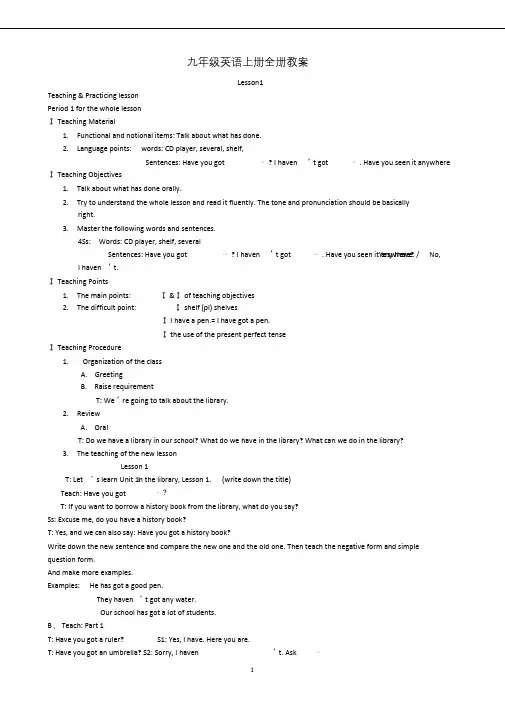
九年级英语上册全册教案Lesson1Teaching & Practicing lessonPeriod 1 for the whole lessonⅠTeaching Material1. Functional and notional items: Talk about what has done.2. Language points: words: CD player, several, shelf,Sentences: Have you got ⋯? I haven ’t got ⋯. Have you seen it anywhere ⅠTeaching Objectives1. Talk about what has done orally.2. Try to understand the whole lesson and read it fluently. The tone and pronunciation should be basicallyright.3. Master the following words and sentences.4Ss: Words: CD player, shelf, severalSentences: Have you gotI haven ’t.⋯? I haven ’t got ⋯. Have you seen i t Y a e n s y,w I h h e a r v e e?./ No,ⅠTeaching Points1. The main points:2. The difficult point: Ⅰ&Ⅰof teaching objectivesⅠshelf (pl) shelvesⅠI have a pen.= I have got a pen.Ⅰthe use of the present perfect tenseⅠTeaching Procedure1. Organization of the classA. GreetingB. Raise requirementT: We ’re going to talk about the library.2. ReviewA. OralT: Do we have a library in our school? What do we have in the library? What can we do in the library?3. The teaching of the new lessonLesson 1T: Let ’s learn Unit 1I n the library, Lesson 1. (write down the title)Teach: Have you got ⋯ ?T: If you want to borrow a history book from the library, what do you say?Ss: Excuse me, do you have a history book?T: Yes, and we can also say: Have you got a history book?Write down the new sentence and compare the new one and the old one. Then teach the negative form and simple question form.And make more examples.Examples: He has got a good pen.They haven ’t got any water.Our school has got a lot of students.B、Teach: Part 1T: Have you got a ruler? S1: Yes, I have. Here you are.T: Have you got an umbrella? S2: Sorry, I haven ’t. Ask ⋯Ask the Ss to use Part 1 to make new dialogue in pairs and then ask some to do it in front of the class. Teach player ”at the same time.B.Teach: severalT: Have you got a pen? How many pens have you got?S1: FiveT: We may also say: “You’ve got several pens. ”Write down the word: severalB.Teach: shelfT: Just now we talked about the library, we know there are many books in the library. Where are the books put?shelf (pl) shelvesTeach: on the shelfB.Part2T: Now I ’d like you to make a dialogue talking about borrowing books about different subjects.Do it in pairs first then ask some to do it.⋯at the moment = now = right nowAnalysis: books aboutB.Part 3Dialogue 1Listen and answer: Well, when you borrow books from the library, you must be careful, but Jim is not careful. What happened? Where was the book?Then read it and learn the dialogue.Analysis: Have you seen it anywhere? ( tense and the use of anywhere)Dialogue 2Listen and answer: How about Tom? What has he lost? Where was it?Read and learn.Analysis: have lost (tense)Perhaps he ’s seen it. ( ‘s is short for has)I saw it on Lin Tao ’s desk five minutes ago. ( tense)B. Conclusion2 several = a few 3.on the shelf 4. the present perfect tense1. have got = haveA. Wb. Ex1 &24. Homework1. Do Wb. Ex 3&42. Recite Part 3Lesson 2Reading lesson2 periods for Lesson 2ⅠTeaching Materials1. Language points:Words: already, yard, schoolyard, step, librarian, probably, pay, sadly, mark, bookmarkPhrases: used to, put down, pay for, come up withSentences: Her hobby is reading.So was the librarian.Now her lost books are usually returned to the library.ⅠTeaching Objectives1. Read the whole lesson and try to understand its content. Make sure to answer the questions in Wbcorrectly.2. Read the lesson fluently, the pronunciation and tone should be right.ⅠTeaching Points1. The main points ---(1)&(2) in teaching objectives2. The difficult pointsA: already, “al ”makes an / / soundB: the difference betweenC: make sb. + adj.“on”and “about ”D: used to do sth.E: come up with an idea= think of an ideaPeriod 1ⅠTeaching Procedure1. Organization of the classT: Today we are going to Lesson 2, in Lesson 2, we are going to talk about the library.2. ReviewT: Before we learn the new lesson, let ’s go over what we learned yesterday.A. OrallyHave = have got Has = has got Several=a few On the shelf eg. They don ’t have any shelves.= They haveneg. Does he have a CD player?= Has he got a CD player?’t got any shelves.The construction and concept of the present perfect tenseB. Recite Part 2C. Wb. Ex33. The teaching of the new lessonA. Lesson 2T: We know we can borrow books from a library. But if we lose the books, what should we do? Let go on to learn Lesson 2, we will know the answer in it.( write down Lesson 2)B. pay forWell, you should pay for it.Teach: pay, paid, paidPay for : give money to sb. for sth.C. onT: Why do people like to go to the library?T: Because there are books on many different subjects.D. knowledgePeople can learn much knowledge from them.E. Part 1 Pre- r eadF. Part 2Ask the Ss the read the passage and answer questions in their Wb. Ex 1G. Read and learnParagraph 1’s grandma?T: How old is the writerWhat was she?What is her hobby?Why does she love books?4. Homework.A. Read the end of the text and finish the exercises in Wb.Junior English for ChinaBook 3Lesson 3课型:讲练课ⅠTeaching Materials1. Functional and notional itemsAsk questions about something has done2. Language MaterialsWords: encourage, once, abroad, copyPhrases: think of, encourage sb. to do sth., get sth. back, pick upSentences: Have you ever been abroad? Yes, just once.I ’ve just cleaned the kitchen.Really? I did that hours ago.Grammar: The difference between the present perfect tense and the past indefinite tenseⅠTeaching Objectives1. Learn to ask questions about something has done2. Read the whole lesson fluently, and pronunciation and intonation should be right.3. Master the following materials(4 skills) Words: once, copyPhrases: think of, pick upSentences: Have you been abroad? Yes, only once.(3 skills)Words: encourage, abroadPhrases: get sth. back, be abroadⅠTeaching Points1. The main points: (1)&(2) in teaching objectives2. The difficult points:A. “ever, just, already ”, they should be put in the middle of “have done ”B. The difference between the present perfect tense and the past indefinite tenseⅠTeaching Procedure1. Organization of the class2. RevisionBefore we go on to learn the new lesson, let’s go over what we learn in Lesson 2.A. OralGrandma lost library books. If she really lose them, what should she do?Did the librarian have any ideas? What is it?What did they doB. Workbook Ex23. The teaching of the new lessonA. Lesson 3Can Grandma get all her lost books back? Let ’s go on to learn Lesson 3.B. Read Part 1 and answer the following questions:Did Grandma get all her lost books back?How did she get them back?C. Read and learn*Think of: 认为、想起、想出Eg: What do you think of it?I often think of my friends in Beijing.*Encourage sb. to do sth.Eg. The teacher thought a lot about how to encourage his students to study hard.*Pick up: pick it\them up*return sth. to sb.*get sth. from sb.D. Reading practiceE. Retell the storyF. Ask and answerHave you ever picked up a library book? Yes, I have\ No, I haven ’t.Ask the students to ask and answer in pairs by using Part 2 and ask some to do it in class.Teach: abroad, onceDo Wb. Ex1G. Part 3Play and English songT: Have you ever listened to foreign music?Ss: Yes, we have.T: And we have just listened to it.Make sentences by usingRead and learn“I have just ⋯”Teach: copyPoint out the difference between the present perfect tense and the past indefinite tense.The present perfect tense shouldn H. Conclusionthe use of ’t be used together with the past time.“ever, just, already ”in the present perfect tense the difference between the present perfect tense and the past indefinite tense4. HomeworkA. Wb. EX2&3B. Go over the language pointsLesson 4课型:练习课ⅠTeaching Materials3. Language MaterialsWords: spoil, as, screenPhrases: on the computer, find outSentences: I guess somebody else has borrowed it.Could you find out who has taken it?Grammar: The present perfect tenseⅠTeaching Objectives4. Read the whole lesson fluently, and pronunciation and intonation should be right.5. Learn to read the information on the library cards and the computer screen.6. Master the following materials(4 skills) Word: asphrase: on the computer, find outWords: spoil, screen(3 skills)ⅠTeaching Points3. The main points: (1)&(2) in teaching objectives4. The difficult points: learn to read the information on the library cards and the computer screenⅠTeaching Procedure5. Organization of the classToday, we are going to learn Lesson 4. In Lesson 4, we’regoing to talk about the information on thelibrary cards and the computer screen.6. Revision’s go over what we learn in Lesson 3.Before we go on to learn the new lesson, letA. OralHow could Grandma get all her lost books back?the use of the adverbs in the present perfect tense.7. The teaching of the new lessonA. Lesson 4Yesterday, we learned that grandma usually borrowed books from the library. There is a new librarytoday. If you want to read books, how can you find them? Let ’s go on to learn Lesson 4.B. Part1I ’d like you to listen and do Wb. Ex.1C. Part 2Ask the students to write down something about the school librarian and report it to the class. Teach:as He works there as a shop assistant.D. Part 4Learn to read the information on the cards and the computer screen.E. Part 3Listen and answer: What does the boy want to borrow?What’s its name?Who has borrowed it?Read and learn.has borrowed, has taken, has got( the present perfect tense)find outRead and act.F. Part 5Read and learn.G. Checkpoint 1H. Wb. Ex.2&58. HomeworkA. Wb. Ex 3B. Go over the whole unit.Lesson 5课型:讲练课ⅠTeaching Materials4. Functional and notional itemsA. Learn to ask how long sb. has done sth.B. Learn to talk about if someone has been to a place.5. Language MaterialsWords: surf, surfing, surfer, wave, Hawaii, beach, twice, Bondi, none, Newquay, water -ski, canoe Phrases: have a try, since last Wednesday, learn sth. from sb. how to do it, several timesSentences: What ’s ⋯like?How long have you been in Sydney?Have you ever been to ⋯ ?Grammar: the present perfect tenseⅠTeaching Objectives7. Learn to ask questions about something has done8. Read the whole lesson fluently, and pronunciation and intonation should be right.9. Master the following materials(4 skills) Words: surf, surfing, surfer, wave, beach, twice, nonePhrases: have a trySentences: Have you been to Words: water -ski, canoe ⋯? Several times.(3 skills)(1 skill) Words: Hawaii, Bondi, NewquayⅠTeaching Points5. The main points: (1)&(2) in teaching objectives6. The difficult points:A. “ever, just, already ”, they should be put in the middle of “have done ”B. The difference between the present perfect tense and the past indefinite tenseⅠTeaching Procedure9. Organization of the classToday, we ’re going to talk about water sports.2. RevisionRevise the names of the sports they have learnt: roller -skating, skating, jump, race, skiing.10. The teaching of the new lessonA. Lesson 5And swimming is a kind of water sport because you have to swim in the water.Well, what other water sports do you know? LetB. Use colour page1 to teach: surf, surfing, surfer, wave, water -skiing, canoe.C. Part 1’s go on to learn Unit 2 Water sports.Listen and answer: Who can surf, Ted or Bruce?How long has Bruce been in Sydney?Why did he come to Sydney?Who teach Bruce to surf?Read and learn:What’s ⋯like? = How is Since last Wednesday Learn sth. from sb. Have you ever been to Have a try⋯ ? ⋯ ?How to do itD. Read and act.E. Part 2Have you ever surfed?Have you ever been to Hawaii?Ask and answer in pairsLearn: Bondi, Cape Town, Newquay, noneNo one none人单数No one is here人/物单数/复数None of them is here.F. Wb. Ex3. 2 . 1 .G. ConclusionSurf, surfing, surfer, waveH e’s a surfer. Have a tryHow long have you been in Have you ever been to⋯ ? ⋯ ?11. Homeworkwb. Ex 2 P.S.The writing on the blackboardUnit 2 Water sportsLesson 5surf ⅠWhat ’s ⋯ like? = How is ⋯ H?ave a try surfing surfer ⅠHow long have you been in Since last Wednesday ⅠHave you ever been to ⅠNone of us has.l ⋯e a?rn sth. from sb. no one 人/ 单 wave ⋯ n?one 人/物 单/复none of us (true)no one of us (false)Hawaii Cape TownNo one has.Lesson 6ⅠTeaching MaterialsWords: describe, especially, attract, so - c alled, possible, since, part -time, although, fit, prize, competition, event,Olympic, Waikiki, Honolulu, San FranciscoPhrases: all over, large numbers of, no matter, both Sentences: Now it is enjoyed by people all over the world.You can always find surfers out riding the waves.⋯ and ⋯ , give up, ever since, the Olympic GamesIn the morning, he works as a part -time assistant in a surf shop.ⅠTeaching Objectives1. Try to understand the whole passage and read the whole lesson fluently and the pronunciation andintonation should be right. 2. Master the following materials:4Ss Words: describe, especially, attract, so-called, possible, since, part-time, although, fit, prize,competition, event, OlympicPhrases: all over, large numbers of, no matter, both Sentences: Now it is enjoyed by people all over the world.You can always find surfers out riding the waves.In the morning, he works as a part -time assistant in a surf shop.3. Master the following materials:⋯ and ⋯ , give up, ever since, the Olympic Game3Ss Words: Waikiki, Honolulu, San FranciscoⅠ Teaching Points1. The main points: (1) &(2) in teaching objectives2. The difficult points: A. the use of “although ”B. the use of “no matter ”C. the use of “both ⋯and⋯”ⅠTeaching ProcedurePeriod 11. Organization of the classTalk about surfing2. ReviewHave you ever been to Qingdao?Who has ever been to Bondi Beach? None of us.Has anybody water -skied before? Nobody has.3. The teaching of the new lessonA. Lesson 6In Lesson 5, we learned some water sports. Today, we are going to talk about one of them ---- surfing.B. Talk about surfingWhere is the best place for surfing? Why?Have you ever watched people surf?What do you think of it?Ask the students to say something about it.Teach: fit, prize, competitionSurfing will make you fit( healthy). Maybe you can take part in a surfing competition, then you maywin a prize.Part 1 Pre-read Ask and answer then teach: watch sb. do sth.; describe sth.C. Part 2Read and do wb. Ex.1D. Conclusion.fit, win a prize4. HomeworkA. Go over what we learn todayB. Read the passage and find out all the new words, try to guess their meaning.Period 2Teaching Procedure1. Organization of the classLearn the passage2. ReviewWatch sb. do sth.; fit(healthy); win a prize3. The teaching of the new lessonA. Paragraph 1Find out the key sentence. Then learn the new language points.one of ⋯; be enjoyed by sb.; all over the world= everywhere in the world;be famous for\ as; especially; attract sb. to somewhere; large numbers of people(it is used to modifycountable nouns)= a number ofRead this paragraph after the tape and then read it together. Ask some to read it in classB. Paragraph 2Find out the key sentence. Then learn the new language points..Read this paragraph after the tape and then read it together. Ask some to read it in classC. Paragraph 3Find out the key sentence. Then learn the new language points.D. Paragraph 4Find out the key sentence. Then learn the new language points.E. Conclusion4. HomeworkA. Wb. Ex. 2&3B. Retell the storyLesson 7课型:讲练课ⅠTeaching Materials1. Functional and notional itemsLearn to talk about something has done2. Language materialsWords: such, fail, practice, New Zealand, businessPhrases: such great fun, on business, so farSentences: Time flies!H e’s gone to New Zealand on business.ⅠTeaching Objectives1. Learn to talk about something has done.2. Try to understand the content and read the dialogue fluently, the pronunciation and intonation should beright.3. Master the following materials:4 skills Words: such, fail, practice, businessPhrases: so far, on business⋯Sentences: He ’s gone to4. Master the following materials:2 skills Words: New ZealandⅠTeaching Points1. The main points: (1) & (2) in teaching objectives2. The difficult pointsA. such great funsuch+adj. +n.( 不可数/复数)such a + adj. + n.( 可数名词单数)与so 的区别B. have been surfingC. practice sth.\ doing sth.D. gone to & been togone to 去了,强调不在说话地点been to 去过,强调对某地有所了解,可以在说话地点ⅠTeaching Procedure1. Organization of the classWe are going to talk about Bruce and Ted again. In grammar, we are going to talk about the present perfect tense.2. RevisionA. Retell the story in Lesson 6.B. Wb. Ex2&33. The teaching of the new lessonA. Lesson 7In lesson 5, we know Bruce will show Ted how to surf. Can Ted surf now?B. Listen and answerCan Ted surf? What has Bruce been doing every day? Why?When is Ted leaving for home?How about Bruce?Where is Bruce ’s uncle?C. Read and learnTeach: *on Bondi Beach*such great fun: very funnysuch beautiful flowerssuch+adj. +n.(不可数/复数)such a + adj. + n.(可数名词单数) such a beautiful flowerso+ adj. So beautiful a flower如果在数量词“many, much, few, little 前,要”用“so”eg: so much water, so many people* fail (in) the examfail to do sth.=can ’t do sth.eg: fail the exam=not pass the examfail to catch the bus= miss the bus* need more practicepractice: 练习,实践(为不可数名词)如:Practice makes perfect.Practice : 练习(为及物动词)如:practice doing sth.* Time flies.* gone to 去了,强调不在说话地点been to 去过,强调对某地有所了解,可以在说话地点eg: Where is he? H e’s gone to his home.* on businessD. Reading Practice.E. Part 2 Ask and answeryet 用于否定句,一般疑问句及条件状语从句already 用于肯定句,如果用于一般疑问句则表示惊讶的语气F. Answer the questions in groups. Teach: so far: up to nowAsk some to do it in classG. ConclusionH. Wb. Ex 14. HomeworkA. Recite Part 1B. Go over the whole lessonLesson 8课型:练习课ⅠTeaching MaterialsWords: cross, channel, mainland, slow, journey, among, proud, pride, unless, shot, truth⋯but also ⋯Phrases: come true, slow down, be proud of, speak highly of, not onlySentences: Among them were his parents.He is not only the pride of our school, but also the pride of all the people in Hainan.ⅠTeaching Objectives1. Read the passage in Part 3 and try to understand its meaning. Read it fluently and the pronunciation andintonation should be right.2. Finish all the exercises in this lesson.3. Master the following materials as four skills:Words: cross, channel, mainland, slow, journey, among, proud, pride,⋯but also ⋯Phrases: come true, slow down, be proud of, speak highly of, not onlySentences: Among them were his parents.He is not only the pride of our school, but also the pride of all thepeople in Hainan.4. Master the following materials as three skills: words: unless, shot, truthⅠTeaching Points1. The main points: (1) & (2) in teaching objectives⋯如b果ut连al接s o两个⋯主语时,用就近一致原则。
Unit 11 Sad movies make me cryThe Shirt of a Happy Man(part1)Section A 3a-3cTeaching Aims1.be able to pronounce, spell and use the following words and expressions correctly and use them in the context.words: power, wealth, fame , positionexpressions: feel like doing, call in, make somebody +adj2.understand the fable in terms of the development of the story.3. use proper skills to finish the reading tasks. (skim and scan)4. the students can better understand what is true happiness. Teaching emphasis and difficultyEmphasis:understand the text and figure out the definition of happiness. Difficulty:Retell the story.Teaching and learning strategies1.Situational teaching method.2.task-based teaching method.3.Group cooperation.Teaching proceduresStep 1. Warming upUse pictures to lead to the new lesson:Look at these happy people.1. Teaching makes me happy.2. The toy makes my daughter happy.3. Xie Na’s job makes her happy.Step 2. DiscussionWhat makes you happy ?( Discuss in group of four?)What is happiness?Step 3.ListeningListen to the tape and answer the question:Is the king happy?Step 4.Fast reading:Read the story fast and answer the following questions in 3minutes.1.Who suggested the king should have a shirt of a happy man?2. Who else was called in to help?Step 5.Careful readinga.Read para 1 and answer the two questions.1. When and where did the story happen?2.What’s wrong with the king?b.Read Para.2 and decide which sentence is true and which is false.(1)Medicine can help the king.(2)Rest can not help the king.(3)The king needs the shirt of a famous person to make him happy .c. Read Para.6 and talk about with your partner:(1)Can the top general finish the task in 3 days?(2) What kind of person would the general find?Step 6.Intensive readingRead the passage again and discuss :After reading the story, what do you think can make people happy?Step 7 Exercise3b. Find words or phrases from the story with meanings similar to these phrases.1.did not want to eat2.was asked to come and help3.look carefully at4.becoming less important5.get my jobStep 8 Homework1、Write the summary of the story.2、Write the rest of the story if you like.The blackboard designThe Shirt of a Happy Man (Part 1)Sth make sb +adjpowerWealthFameFeel like doing sth Call inExamineTake one’s position。
Unit 1How can we become good learners?Section A (1a-2d)1.重点单词:textbook,conversation,aloud,pronunciation,sentence2.重点短语:make word cards,work with friends,ask the teacher for help,listen to tapes,speaking skills,word by word,be patient3.重点句式:How can we become good learners?—How do you study for a test?—I study by working with a group.What about reading aloud to practice pronunciation?It's too hard to understand spoken English.—Have you ever studied with a group?—Yes,I have.I've learned a lot that way.Try to guess a word's meaning by reading the sentences before and after it.You can become better by reading something you enjoy every day.The more you read,the faster you'll be.1.重点短语和句型2.How对方式进行提问及用by+doing回答How对方式进行提问及用by+doing 回答一、预习课本P1-2新单词并背诵,完成下面的汉译英。
1.课本____________ 2.交谈____________3.大声地____________ 4.发音(n.)____________5.句子____________ 6.有耐心的____________二、认真预习1a-2d找出下列短语和句型。
1.制作单词卡片________________________________________________________________________ 2.和朋友一起学习________________________________________________________________________ 3.向老师请教________________________________________________________________________ 4.听磁带________________________________________________________________________ 5.口语技能________________________________________________________________________ 6.逐词地________________________________________________________________________ 7.耐心点儿________________________________________________________________________ 8.我们怎样才能成为好的学习者?________________________________________________________________________9.——你怎样为考试复习做准备?——我通过和小组合作来学习。
________________________________________________________________________________________________________________________________________________10.大声朗读来练习发音怎么样呢?________________________________________________________________________11.理解英语口语太难了。
________________________________________________________________________12.——你曾经和小组一起学习吗?——是的,用那种方法我学到很多。
________________________________________________________________________________________________________________________________________________13.通过阅读一个单词前后的句子尽量来猜测它的意思。
________________________________________________________________________14.通过每天阅读一些你喜欢的东西,你能变得更好。
________________________________________________________________________15.你读得越多,就会读得越快。
________________________________________________________________________Step 1情景导入(Show some pictures about ways to learn English)Teacher:Do you like English?How do you learn English?There are some good ways to learn English.Let's learn the ways to learn English like this:How do you study English?I learn English by listening to tapes.环节说明:由图片入手,图文并茂,引起学生的学习兴趣。
Step 2完成教材1a-1c的任务1.学生领读1a中的短语,教师纠正错误读音,学生识记短语后再添加其他的学习英语的方法并且熟悉by doing sth.的用法。
(3分钟)。
2.认真听录音,看看这些学生的学习方法,紧挨着名字写下图中的字母。
(2分钟)3.再听一遍录音,并跟读对话。
(2分钟)4.结对练习1c中的对话,并请一些学生表演出他们的对话。
(3分钟)5.模仿1c中的对话,结合1b的答案材料与同伴编练新对话,并邀请几组学生表演对话。
(5分钟)参考案例A:How do you study for a test?B:I study by working with a group.6.小结训练。
(3分钟)(B)1.________ do you study for a test?A.What B.How C.When D.Where(D)2.He learns English by ________ English songs.A.listen B.listen toC.listening D.listening to(D)3.How do you study ________ an examination?A.to B.at C.with D.for(A)4.Do you often have meals ________ your parents?A.with B.for C.to D.at(B)5.—How do you study for a test?—I study by ________.A.ask the teacher for helpB.asking the teacher for helpC.ask the teacher to helpD.asking the teacher to help环节说明:听说结合,第一时间向学生传达了语言目标,通过结对对话练习和小结训练,使语言目标得以强化。
Step 3完成教材2a-2c的任务1.在小组内认真读一读2a中的句子并交流句子的意思,为听力做好准备。
(2分钟)2.认真听录音,在你听到的问题前打勾。
(2分钟)3.再认真听一遍录音,从2b中把2a中的问题的答案找出来,把序号填写在2a表格Answers 栏目下,集体核对答案。
(3分钟)4.让学生利用2a, 2b中的信息仿照2c 的形式练习对话,并要求多组同学表演对话。
(5分钟)参考案例A:Have you ever studied with a group?B:Yes.I have.I've learned a lot that way.5.小结训练。
(2分钟)1.What about reading(read) aloud to practice pronunciation?2.Listening to tapes improves my listening skills(skill).3.Have you ever studied (study) with a group?4.It's too hard for me to_learn (learn) English.5.We should practice speaking (speak) English aloud every morning.环节说明:通过听、说、读、写训练让学生掌握了询问方式的句型及答语,并且使学生的口语表达能力在这一环节得到提升。
Step 4完成教材2d的任务1.学生自读对话,回答下面的问题。
(5分钟)1)Why is Jack nervous?2)How should Jack read faster?3)What's Annie's advice about understanding the words?2.大声朗读2d中的对话,读熟后与同伴结对练习,分角色表演对话。
(3分钟)3.邀请三组同学来表演对话。
(5分钟)4.小结训练。
(3分钟)1.不要逐词地读,要读字群。
Don't_read_word_by_word.Read_word_groups.2.每天读一些你喜欢的东西你就能变得更好。
You_can_become_better_by_reading_something_you_enjoy_every_day.3.你读得越多,读得越快。